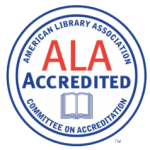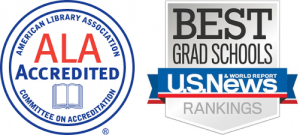Master of Library and Information Science (MLIS)
Explore Careers in Libraries, Archives, Museums, the Government, and More!
The UMD Master of Library and Information Science (MLIS) program, ranked #3 in the U.S., prepares students to support information institutions such as libraries, museums, and archives—and to innovate and advocate to meet the information needs of individuals and communities. Students in the MLIS program become experts in curation, digital asset management, information architecture, ethics, human rights, information policy, and youth learning. For students pursuing a school library media specialist career, a state certification is earned as part of the curriculum through the school library certification focus area.
Located just outside Washington DC, MLIS students have unparalleled opportunities to work on projects with leading information agencies and organizations.
Current MLIS Students Quick Links
New Students: Next Steps
Student Services & Advising
Curriculum
Support Resources & Financial Aid
Student Organizations
Interested in a Master of Library and Information Science?
Are you interested in joining the UMD MLIS program? Please connect with our program team! We’d love to hear from you.
Curriculum:
The UMD Master of Library and Information Science (MLIS) program requires 36 credit hours of academic work. Students may take a field study track OR a thesis track:
- Field Study Track: 4 core courses (12 credits), 7 electives (21 credits), 1 field study (3 credits)
- Thesis Track: 4 core courses (12 credits), 5 electives (15 credits), 1 thesis (9 credits)
(Detailed list of classes)
Students are able to customize their MLIS degree by choosing electives that align with their career goals. Common elective focus areas include:
- Archives and Digital Curation
- Diversity and Inclusion
- Youth Experience
- Intelligence and Analytics
- Legal Informatics
- School Library Certification for the State of MD
Fast Facts:
- The typical enrollment at any one time in the program is three-hundred students, with an average Fall cohort entrance of seventy to eighty and an average Spring cohort entrance of thirty-five to forty students.
- Average class size can range from ten to forty students per class, depending on demand and modality of an online or in-person class offering.
- Our average time to degree completion is 2.22 years with a 96.3% retention rate after two years.
Create a schedule that works for you:
Courses for the MLIS program are offered both in-person and online—allowing you the flexibility to create a hybrid schedule that works for you or to complete the program fully online. The admission requirements and curriculum are the same for both online and in-person students.
As a student in the program, you can choose to participate full-time and earn your degree in as little as two years—or take your time and set your own pace.
Click here to learn more about the UMD Master of Library and Information Science (MLIS) curriculum, elective focus areas, and course planning.
Fast Facts
- Distinguished faculty, including Professor Paul Jaeger, Professor Richard Marciano, Professor Mega Subramaniam, and more
- The prestigious Center for Archival Futures (CAFe) creates more hands-on learning opportunities for students
National Rankings
- #2 in USA – Services for Children and Youth Focus (U.S. News & World Report)
- #3 in USA – MLIS Program Overall (U.S. News & World Report)
- #5 in USA – School Library & Youth Focus Areas and Information Systems Focus Area (U.S. News & World Report)
- #6 in USA – Archives & Preservation Focus Areas (U.S. News & World Report)
Accreditation
- Fully accredited by the American Library Association (ALA). Graduating from an ALA-accredited program provides flexibility in the types jobs you can apply for and enhances career mobility. Many employers require an ALA-accredited master’s degree for professional level positions, and some states require an ALA-accredited degree to work as a professional librarian in public or school libraries.

The INFO MLIS program is fully accredited by the American Library Association (ALA). Graduating from an ALA-accredited program provides flexibility in the types jobs you can apply for and enhances career mobility. Many employers require an ALA-accredited master’s degree for professional level positions, and some states require an ALA-accredited degree to work as a professional librarian in public or school libraries.
“The MLIS program taught me archival theory, which is huge – it keeps me on my path,” says Holly McIntyre, MLIS Alumna and Archivist for NASA Goddard. In 2015, Holly became the first-ever archivist for NASA Goddard. She took 60 years of history and materials and created today’s Goddard Archives.
Career paths:
- Academic libraries
- Government libraries (state or federal government agencies)
- Archives/special collections
- Public libraries
- Museums
- Information technology
- Non-profit organizations other than a library
- School libraries
- Corporate organizations
- Government intelligence
- Law libraries and legal offices
Students interested in becoming a school librarian, through electives, can pursue the requirements for School Library certification in the state of Maryland.
Graduates have worked at: NASA Goddard Archives, Washington Post, Embodied Labs, Inheritance Baltimore, the Newark Museum of Art, UMD Archives, Pennsylvania State Archives, MD Correctional Facility Library Services, American Library Association, Library Associates Companies (LAC), Library of Congress, Public Defender Service for the District of Columbia (PDS), D.C. Court of Appeals, Archives of the Episcopal Diocese of Washington, LGBT Equity Library, National Library of Medicine, as well as many public school libraries, county library systems, law offices, and university/academic libraries.
Graduate placement rate: (2021 UMD Career Center survey): 96.5% placement (employment or continued education); 95% of graduates report that their education at the UMD INFO College supported their career goals.
Meet alumni: Click Here
Recent alumni news: Press Release: UMD INFO’s Allison Jennings-Roche Named 2024 LJ Mover & Shaker
Click here to learn more about the UMD Master of Library and Information Science (MLIS) admission rates, placement rates, and career paths.
At the UMD College of Information, we believe one of the best ways to learn – is to do. In addition to studying under world-renowned faculty, our students learn hands-on with industry professionals who lecture at our college. For aspiring school librarians, we offer exciting field study experiences.
Through internships, class projects, and events, students also build relationships with the INFO College’s 400+ top industry and government partners, such as the Smithsonian, National Archives, MD State Archives, Library of Congress, National Institutes of Health, Department of the Interior, Bloomberg, and the Washington Post.
Our students also have opportunities for hands-on learning at the INFO College’s world-renowned research centers and labs, including the prestigious Center for Archival Futures (CAFe).
INFO’s faculty, staff, and 2800+ students come from over 61 countries and create a welcoming and encouraging environment. 56% of students identify as male, 45% female, 1% other; 63% of students identify Asian (29%), Black (24%), White (22%), Hispanic/Latino (9%), Biracial (4%), American Indian or Alaskan Native (<1%), Pacific Islander (<1%), Unknown/Other (12%). The INFO College is committed to bringing together many perspectives to foster deeper understanding and innovation.
At UMD students can also choose from hundreds of student organizations, including INFO student organizations, service opportunities, and social activities.
Tuition
- In-State (Maryland resident) tuition and fees will amount to approximately $37,000 to complete 36 credit hours.
- Out-of-State tuition and fees will amount to approximately $72,000 to complete 36 credit hours.
View our detailed breakdown of tuition & fees.
Financial Aid
The UMD INFO College provides financial aid to select current students who demonstrate academic excellence. Students may also reduce their tuition costs by serving as a TA or GA at UMD, but please note that these positions are competitive. There are also additional sources of financial aid offered by the University and by outside sources. Learn more about financial aid.
Application Deadline:
The deadline to apply to the UMD Master of Library and Information Science (MLIS) program is January 6 to the Fall 2026 semester beginning in August. The application deadline is September 19 for admission to the Spring 2026 semester beginning in January.
Application Requirements:
- Must have earned a 4-year baccalaureate degree
- 3.0 GPA on prior undergraduate or graduate work
- GRE score is not required
- A TOEFL, IELTS, or PTE score is required for international applicants (more information below)
- Complete the UMD Graduate School application
- Complete the supplemental MLIS application of four questions (max 200 word responses each)
- $75 application fee
You will be required to submit TOEFL, IELTS or PTE scores if you do not hold a degree from a U.S. institution or from one of the English speaking countries. Please check on the list of English speaking countries and options for providing evidence of English proficiency here.
- See the Graduate School’s English Language Proficiency Requirements for instructions on submitting scores. The University of Maryland’s TOEFL Institution Code is 5814.
- You can find English language proficiency requirements here. Please note that your English proficiency scores (including listening, writing, reading, and speaking sub-scores) must satisfy the criteria for full enrollment to be accepted to the HCIM program. HCIM is a very rigorous program that requires an excellent command of the English language. Therefore, Bridge and Intensive English programs are not an option for applicants to the HCIM program. Please see the minimum English Proficiency Scores Requirements for full HCIM admission:
- iBT TOEFL: Total 96 (Speaking 22, Listening 24, Reading 26, Writing 24)
- IELTS: Overall 7 (Listening 7, Reading 7, Writing 7, Speaking 6.5)
- PTE: Total: 68 (Writing 68)
